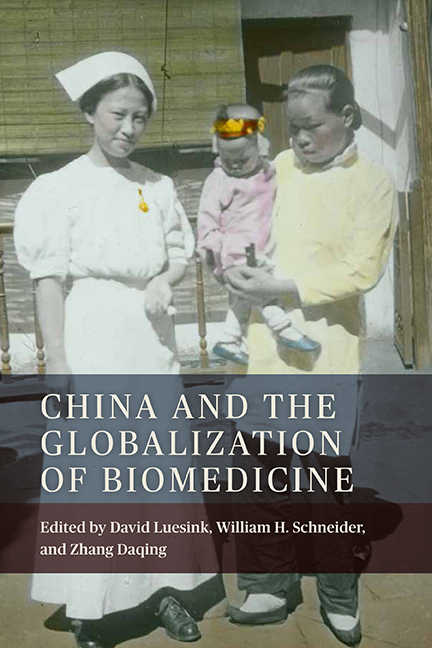Book contents
- Frontmatter
- Dedication
- Contents
- List of Illustrations
- Preface
- Acknowledgments
- List of Abbreviations
- Introduction: China and the Globalization of Biomedicine
- Part One Hygiene and Disease Construction in Late Qing China
- Part Two The Indigenization of Biomedicine in Republican China
- Part Three The Spread of Biomedicine to Southwest China, 1937–1945
- Afterword: Western Medicine and Global Health
- List of Chinese and Japanese Terms and Names
- Selected Bibliography
- List of Contributors
- Index
8 - Serving the People: Chen Zhiqian and the Sichuan Provincial Health Administration, 1939–1945
Published online by Cambridge University Press: 27 March 2021
- Frontmatter
- Dedication
- Contents
- List of Illustrations
- Preface
- Acknowledgments
- List of Abbreviations
- Introduction: China and the Globalization of Biomedicine
- Part One Hygiene and Disease Construction in Late Qing China
- Part Two The Indigenization of Biomedicine in Republican China
- Part Three The Spread of Biomedicine to Southwest China, 1937–1945
- Afterword: Western Medicine and Global Health
- List of Chinese and Japanese Terms and Names
- Selected Bibliography
- List of Contributors
- Index
Summary
Dr. Chen Zhiqian, China's “father of public health,” is consistently celebrated for the five and a half years he spent as director of the Department of Health in north China's model county in Hebei, Dingxian Province. Dr. Chen (also known by the Anglicized name of C. C. Chen) directed public health work in this chief site of the Rural Reconstruction Movement from January 1932 to July 1937. However, he left another important and lasting legacy in his home province of Sichuan during the Second Sino-Japanese War (1937–45), work for which he is seldom recognized. For six years during the war, from May 1939 to November 1945, Chen Zhiqian served as director of the Sichuan Provincial Health Administration (Sichuan sheng weishengchu), or SPHA, in the southwestern province that boasted the wartime capital of Chongqing. Founded in spring 1939 and headquartered in Chen's hometown of Chengdu, the provincial capital, the SPHA established county health centers (xian weishengyuan), or CHCs, in 131 of the province's 139 counties before the war ended in 1945, and continued to operate through 1948. The bulk of this work built on and greatly expanded the Dingxian legacy. Taken as a whole, Chen's Rural Reconstruction work in prewar northern China and his wartime work in Sichuan laid the foundations for the expansion of public health services into rural China in the Communist period.
The work of the SPHA also played a key role in two wartime processes of enormous importance to the nation. First, the establishment of a county health center in all but eight of Sichuan's counties was a chief means by which the once independently ruled province was incorporated into the nation. Doctors, nurses, midwives, and public health personnel who had worked to establish state-administered public health services in other parts of China prior to the war transferred their talents to Sichuan during the war, building a health infrastructure in the once remote province that mirrored that of communities in northern and eastern China. Since public health administration constituted an important part of state formation and nation building, this work did more than treat individual bodies; it constructed Sichuan as part of the national body. Second, CHC staff actively promoted scientific biomedicine in semiurban and rural towns throughout Sichuan.
- Type
- Chapter
- Information
- China and the Globalization of Biomedicine , pp. 215 - 231Publisher: Boydell & BrewerPrint publication year: 2019

